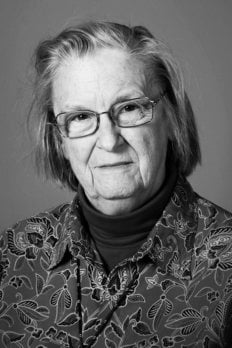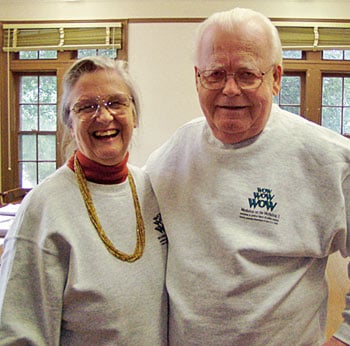Elinor Ostrom
Biographical
 I was born in Los Angeles, California, on August 7, 1933, and grew up during the Great Depression. Fortunately, our house had a large backyard that we filled with a vegetable garden and fruit trees. I learned how to grow vegetables and how to can apricots and peaches during the heat of summer. During World War II, I learned how to knit scarves for the “boys overseas.” My childhood was spent learning and doing the traditional activities of a girl during the last century. My major recreational activity was swimming, and I eventually joined a swimming team and swam competitively until I started teaching swimming to earn funds that I could save to help put me through college.
I was born in Los Angeles, California, on August 7, 1933, and grew up during the Great Depression. Fortunately, our house had a large backyard that we filled with a vegetable garden and fruit trees. I learned how to grow vegetables and how to can apricots and peaches during the heat of summer. During World War II, I learned how to knit scarves for the “boys overseas.” My childhood was spent learning and doing the traditional activities of a girl during the last century. My major recreational activity was swimming, and I eventually joined a swimming team and swam competitively until I started teaching swimming to earn funds that I could save to help put me through college.
Since our home in Los Angeles was located at the lower edge of Beverly Hills, my mother arranged for me to attend Beverly Hills High School. Fortunately, I was encouraged to join the debate team in my junior year of high school and participated actively in speech competitions around the state. Learning debate was an important early impact on my ways of thinking. You are taught that there are always at least two sides to public policy questions, and you have to learn a good argument for both sides as well as knowing how to critique both sides. Participating in team efforts including my debating experience and being on a swimming team was also important.
While it was a challenge being a poor kid in a rich kid’s school, it did give me a different perspective on the future. Since 90 percent of the students in Beverly Hills High School went to college, it appeared going to college was the “normal” thing to do after high school. Even though no one in my immediate family had any college experience, I decided that I should go on to college. My mother saw no reason to support me during my college years since she had been supported only through high school. Fortunately, the semester fees at UCLA at that time were extremely low. I worked in the library, at a dime store, and at the bookstore. I was able to complete my undergraduate degree without going into debt. I took courses across the social sciences and graduated after three years by attending multiple summer sessions and by taking extra courses throughout. In my last year as an undergraduate, I graded Freshmen Economics.
When I started to look for a position after graduation, it was somewhat of a shock to me to have future employers immediately ask whether I had typing and shorthand skills. The presumption in those days was that the appropriate job for a woman was as a secretary or as a teacher in a grade school or high school. I began a correspondence course on shorthand, which I have never used to take dictation, but have found to be very useful when taking notes in face-to-face interviews on research projects. Fortunately, after a year of working as an Export Clerk in a large clerical pool, I did obtain a position as Assistant Personnel Manager for a business firm that had never hired a woman in anything but a secretarial position. I think my experience of obtaining a very good job in my early twenties helped me later when I decided to think about attending graduate-level courses and eventually applying for a research assistantship and admission to a Ph.D. program. I learned not to take initial rejections as being permanent obstacles to moving ahead.
My initial discussions with the Economics Department at UCLA about obtaining a Ph.D. in Economics were, however, pretty discouraging. I had not taken mathematics as an undergraduate primarily because I had been advised as a girl against taking any courses beyond algebra and geometry in high school. While the Economics Department encouraged me to take an outside minor in economics for my Ph.D., they discouraged any further thinking about doing a Ph.D. in economics. Political Science at that time was also skeptical about admitting any women to their Ph.D. program as they feared that only a city college would employ a woman with a Ph.D. That was not a good placement for building the reputation of the UCLA department. I was, however, admitted in a class of 40 students with three other women. We were told after we began our program that the faculty had a very heated meeting in which they criticized the Departmental Committee for admitting any women and offering them assistantships. Fortunately, our fellow male graduate students were friendly and encouraged us all to continue in our program.
In my graduate work, I participated in a research team studying the water industry in Southern California based on some of the initial framing by Vincent Ostrom, Charles Tiebout, and Robert Warren (1961). Several of the graduate students working on this project undertook efforts to analyze the political economy of a group of groundwater basins in Southern California. I was assigned to study the West Basin, which underlay multiple cities along the coast of the Pacific Ocean. The city of Los Angeles partially overlapped the basin as well as a good portion of Los Angeles County. Without knowing I was studying a common-pool resource problem, I became very familiar with the kinds of problems that users of a common-pool resource face in trying to manage such a resource.
It was only after I defended my dissertation in 1965 that Garrett Hardin’s article on “The Tragedy of the Commons” was published in Science, and Mancur Olson’s book on The Logic of Collective Action was published. And, in 1965, Vincent was offered an attractive position as full professor at Indiana University, Bloomington. I tagged along as it was very hard for any department to hire a woman in those days. Fortunately, the Department of Political Science later needed someone to teach Introduction to American Government on Tuesdays, Thursdays, and Saturday mornings at 7:30 a.m. They appointed me as a Visiting Assistant Professor to do that. After a year of teaching freshmen, they asked me if I would be Graduate Advisor and moved me to a regular appointment at that point.
The first 15 years of my research career at Indiana University were focused on studying police industries across the United States. Unfortunately, many scholars had confused multiplicity of units serving the same metropolitan area with a chaotic distribution of services. Not that all multiunit servicedelivery arrangements are effective, but the arrangements we studied in metropolitan areas across the United States were far more effective than the scholarly criticism. We never found a large police department with over 100 officers able to outperform a small- to medium-size department (25–50 officers) in producing direct services including patrol, traffic control, response services, and criminal investigation.
After fifteen years of extensive research on police industry structure and performance, I returned to studying the commons, but this time with the recognition of what I was studying. The National Research Council created a special committee in the mid-1980s to review the empirical research written about common-pool resources. Scholars began to recognize that much research on this topic had been conducted but was divided by discipline, sector, and region. Consequently, scholars who studied inshore fisheries in Africa did not know about other studies of resources in Africa. If they were sociologists, they did not know any of the work done by economists and vice versa. Participating in the NRC committee, and seeing the immense amount of research that had been done but not synthesized, taught me a major lesson. The way we organize the modern American university fragments our knowledge badly. Not only are we divided by discipline, but we are divided by the methods that scholars use. Economists using nationwide statistical data are critical of economists using the experimental lab to test theory. Scholars who do field research are critical of the use of any other method.

Figure 1. Elinor and Vincent Ostrom during WOW3 (Workshop on the Workshop), 2004.
I have been very fortunate that Vincent Ostrom and I were able to establish an effective research center with a different philosophical foundation during the early 1970s. Vincent named it the Workshop in Political Theory and Policy Analysis. He thought the term “workshop” conveyed a sense closer to his philosophical view of science as a form of artisanship (V. Ostrom 1980). The logic of our Workshop has always been that there would be a variety of scholars across economics, political science, and other disciplines who worked together trying to understand how institutional arrangements in a diverse set of ecological and social economic political settings affected behavior and outcomes. We have delved deeply into how institutional arrangements affected performance of urban police agencies, irrigation systems, and forest resources.

Figure 2. The Workshop in Political Theory and Policy Analysis at Indiana University, Bloomington.
The Workshop philosophy has permeated a very large international program started in the early 1990s. The FAO wanted information collected in a systematic way on the conditions in forests and their governance arrangements and how this affected livelihoods as well as forest conditions. We did not think that this was something that was an appropriate thing for scholars in the United States to do by flying out and collecting data in multiple countries. We developed a collaborative network where scholars who lived in a particular country and had very strong interest in forest conditions and forest policy conducted the studies. We very carefully trained a core staff in each center to use the data collection techniques that took many years to work out. We have encouraged regional meetings of scholars in a particular region to discuss method findings and strategies. We meet as a big network every two years and find that we all continue to learn from one another.
If the research that one wants to pursue can all be done sitting in a library carrel somewhere in one’s home institution, then one does not need to develop the equivalent of a Workshop. However, if one is trying to understand and test theory in the field and in the experimental lab and to really pursue in-depth studies of diverse institutional arrangements around the world, then working with colleagues located in diverse settings at various stages of their careers is crucial for making scientific progress. The general strategy that we have used is now described in considerable depth in Poteete, Janssen, and Ostrom (2010).
| References |
| 1. Ostrom, Vincent (1980), “Artisanship and artifact,” Public Administration Review 40(4): 309–17. |
| 2. Ostrom, Vincent, Charles M. Tiebout, and Robert L. Warren (1961), “The organization of government in metropolitan areas: A theoretical inquiry,” American Political Science Review 55(4): 831–42. |
| 3. Poteete, Amy, Marco Janssen, and Elinor Ostrom (2010), Working Together: Collective Action, the Commons, and Multiple Methods in Practice. Princeton, NJ: Princeton University Press. |
This autobiography/biography was written at the time of the award and later published in the book series Les Prix Nobel/ Nobel Lectures/The Nobel Prizes. The information is sometimes updated with an addendum submitted by the Laureate.
Elinor Ostrom died on 12 June 2012.
